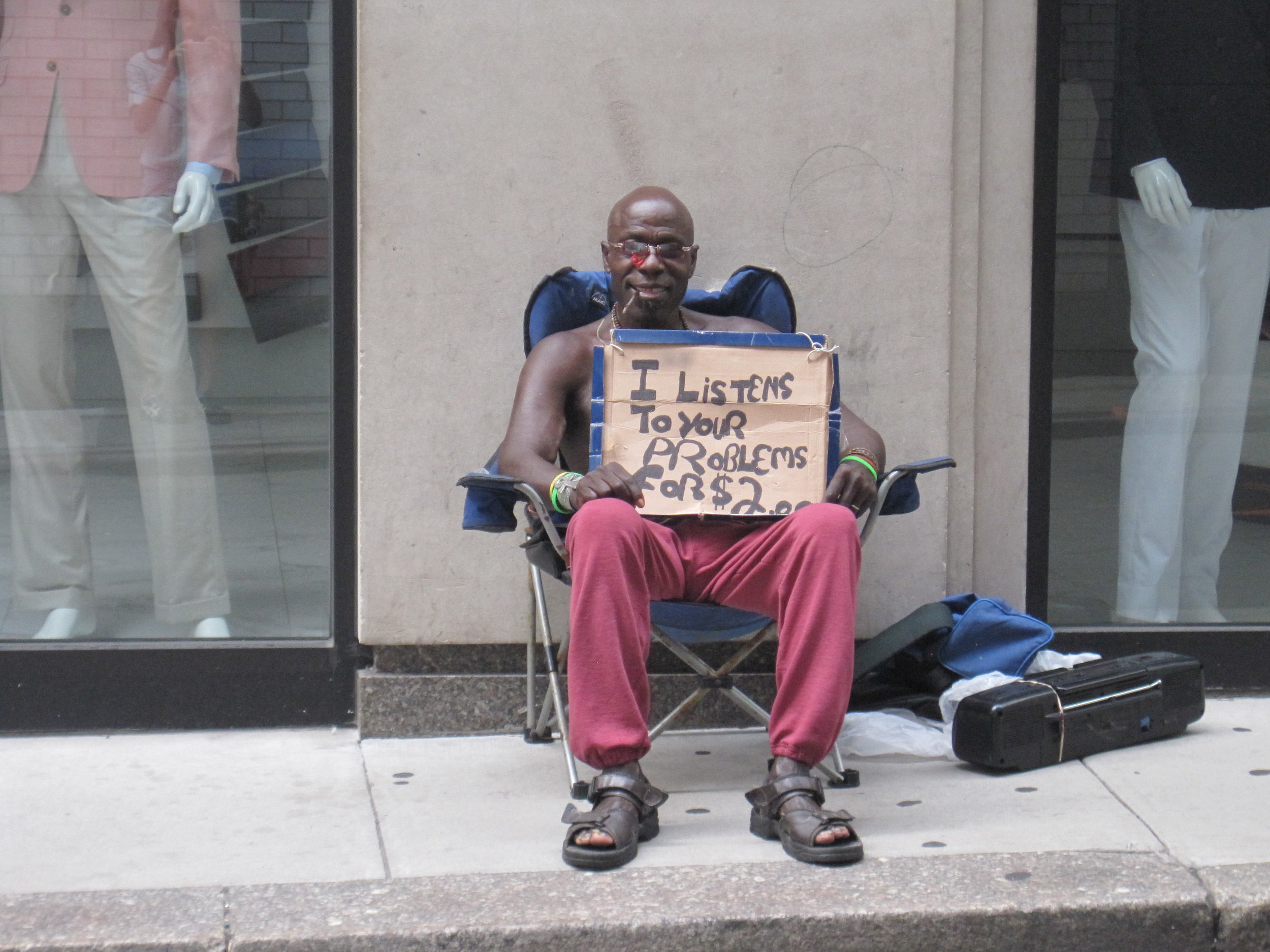Don't walk by: Stories of befriending the homeless
 How did doing nothing become better than doing something?
How did doing nothing become better than doing something?
Most of us want to help the homeless, but we don’t know how. We see a person crouching on the sidewalk and reaching out their hand to us, and though we may wrestle within ourselves and mull over the complexities of homelessness, we often do nothing. We walk by.
This month The Bowery Mission is leading an initiative called Don’t Walk By. More than 1,400 volunteers walk the 6,000 blocks of Manhattan in “search and rescue” teams. The volunteers ask the homeless they encounter if they would like to eat dinner, see a doctor, enroll in a work program, sleep in a bed or find new clothes at a church that night. If the answer is yes, volunteers drive them in vans to the church.
After hearing the buzz around campus about last year’s Don’t Walk By, I marked my calendar for this year’s project, the fifth anniversary.
Volunteers first gathered (cheerfully, I might add) in the rustic sanctuary of Calvary Baptist Church in East Midtown. Bowery Mission leaders briefed our group and warmed us with lentil soup before sending out teams of six to eight people.
I had occasionally talked to homeless men and women before, usually out of a gnawing sense of sympathy or guilt. My typical encounter went something like this:
Me: Hi, my name is Meagan.
[Slightly awkward pause while he or she stares at me.]
Can I get you something?
Them: Do you have some change?
Me: I don’t have cash, but here’s a granola bar.
Them: Okay, thank you.
Me: Okay… [feeling shy by now] God bless!
Then I could at least pat myself on the back for not “walking by,” I thought. But recently I’ve realized (and I’m sure I’ve been slow to learn this) there is often something more valuable to the homeless than granola bars or dollar bills--something all of us can give.
About a month ago, my friends and I were walking home from church in Union Square when a homeless man reached out his hand and asked for change. The temperature was bone chilling, and he had been sitting on a windy corner for hours.
Now, this is not an uncommon scene. Maybe we wouldn’t have stopped if we hadn’t just left a church service. For whatever reason, I did stop and gave him five dollars, the equivalent of a Starbucks grande vanilla latte or a T-shirt from a thrift shop (oh, the ironies of middle-class college students buying cheap shirts and designer drinks).
What followed was a 20-minute conversation with my friends and Chris, a currently homeless man who lost his wife and then his job as a computer technician while grieving. While one friend brought Chris coffee from our church (he didn’t want to go inside), my other friend and I talked with and prayed for Chris.
I intended to give a homeless man five dollars in five seconds. I ended up meeting Chris. Before working in IT, he was a chef on Madison Avenue. He loved his family and is now alone. He probably needed to vent to us about getting his clothes stolen at a shelter more than he needed my five dollars. And he barely touched his coffee, although he took off his gloves to hold my hand while my friend and I prayed for him.
At Don’t Walk By, the leaders echoed my experience. They suggest a few questions to begin conversations: What is your name? How are you doing? How long have you been going through this tough time?
I have to admit, I am the type of person that always wants to do. Give me a task, and I’ll set some goals and execute. So even after meeting Chris, even after hearing these conversation-starters, my natural inclination while volunteering with Don’t Walk By was to: 1. Find a homeless person and 2. Try to persuade them to get in a van and go to dinner. That was the goal right?
No, I realized (again, I’ve been slow to learn this).
I met Leeroy and John, catching a basketball game on TV in Penn Station. Leeroy worked in a printing shop in Penn Station before he retired, and John has been unemployed after he developed a hernia around his spine from a basketball injury. Both have been sleeping on the subway for years. I might not have known this if my fellow volunteer hadn’t taken the time to lead a normal and genuine conversation with the two men.
After teaching us about the perks of Penn Station over Grand Central, Leeroy and John ventured over to Calvary Baptist. John even promised to pray for me.
The moment I stopped to talk to Leeroy, John, or Chris, to learn their names and their stories, and to befriend them, I can never again walk by without stopping to chat. Inconvenient? Maybe, but that depends on our “goals” and what we perceive as a “valuable” use of our time.
We may not be able to cure someone’s problems, but we can at least take the time to learn what their problems are.
Don’t Walk By describes their goal as taking away the barriers between the homeless and adequate medical care, shelter, food, clothing, and other necessities. Merely offering the available services is a success story.
The final Don’t Walk By outreach will take place on the East Side Saturday, Feb. 23. Check out www.dontwalkby.org for more details.
We can’t do everything, but we can do something.

